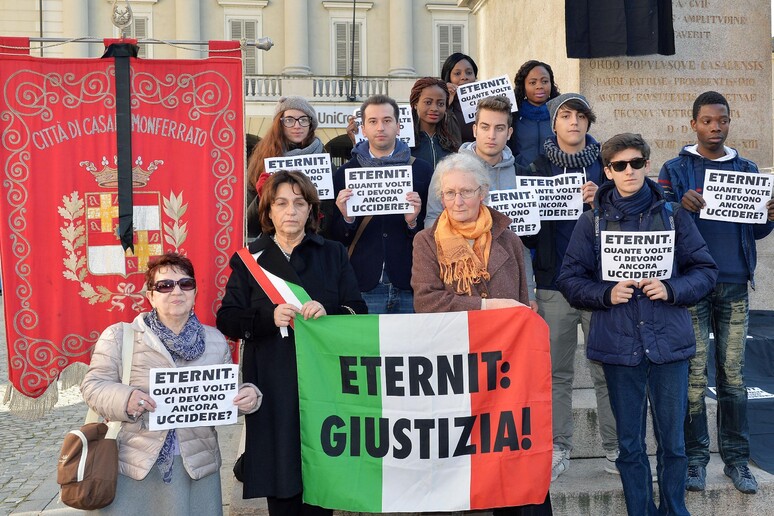Families of victims of deadly
asbestos poisoning took hope Thursday after prosecutors in Turin
completed a homicide probe into former Eternit owner Stephan
Schmidheiny that could see him face charges over 263 deaths,
said ANSA sources.
That came one day after Italy's highest appeals body, the
Court of Cassation, overturned an 18-year prison sentence
against the Swiss tycoon, whose now-defunct Eternit ran several
asbestos cement plants blamed for more than 2,000 deaths.
Grieving families of victims, outraged over Wednesday's
supreme court decision, took hope from the Turin case as well as
from government pledges on Thursday to change the statute of
limitations law that led to the annulment of the sole conviction
in the asbestos environmental disaster.
Schmidheiny had been charged with failing to provide
adequate safety measures at the plants, but the high court said
the case had timed out.
Schmidheiny has denied the charges.
In a statement Thursday, the Cassation Court added its
remit was to deal only with the issue of an asbestos
environmental disaster from 1986, the year an Eternit factory
closed, rather than with individual cases of illnesses and
deaths.
The objective "was to ascertain whether or not the disaster
occurred," the Court said in a note.
Turin prosecutors opened three separate cases related to
the Eternit factories, including one involving murder
allegations against Schmidheiny. The second case refers to
Italians who died after working in Eternit plants in Switzerland
and Brazil, and the third concerns a major quarry near Turin
that produced asbestos and was connected to Eternit.
Premier Matteo Renzi meanwhile said he would change Italy's
statute of limitations, a promise supported by leaders of the
Lower House and Senate who said they reached an agreement on the
procedure for moving Renzi's bill through parliament.
"If a case like Eternit is a timed-out crime, then we have
to change the rules of the game on the statute of limitations,"
Renzi told RTL radio station.
"We can't have the nightmare of the statute of limitations
(in these cases). You cannot deprive people of the demand for
justice," Renzi said.
"I was struck, as an ordinary citizen, by the interviews
with the families (of the victims). They made me shudder a
little".
About 150 people belonging to an Eternit victims group
protested Wednesday outside the Cassation Court including many
from Casale Monferrato in Piedmont, and others from different
regions of northern Italy as well as people from Switzerland and
Brazil.
Their leader Romana Blasotti, 85, lost five family members
to asbestos-related diseases, which can often take many years to
appear.
One of the most common diseases, mesothelioma, can take
decades after contamination to make itself known, making
liability hard to prove.
"We want justice, and we believe that we will have it,
after 35 years of struggle," said Blasotti, whose husband died
in 1983, followed by a sister, a niece, a cousin and a daughter.
"When we started our battle, we knew we had to do it for
our young people...but we did not succeed. The death rate in
Casale continues at a rate of 50 to 60 deaths per year," she
said.
Paolo Liedholm of Casale Monferrato, who lost his mother to
asbestos-related illness, was bitter about Wednesday's decision,
saying people continue to die with no recourse.
"Now we have clearly established this: if you want to kill
someone in Italy the best means is asbestos because it is
legal," he said.
He added that victims believe the peak in asbestos-related
deaths has not yet occurred because of the time it takes for the
disease to appear.
Asbestos-linked tumours have been reported among Eternit
staff, their families and people living near the factories who
were affected by asbestos dust in the air, while hundreds more
fell ill.
Employees and their families have long claimed that Eternit
did little or nothing to protect its workers and residents
living around its factories from the dangers of asbestos.
The Italian National Magistrates Association (ANM) said
Thursday that it has been calling for Italy's statute of
limitations laws to be changed for years.
"Magistrates have been raising the problem of the statute
of limitations for years", Rodolfo Sabelli, president of the ANM
said.
ALL RIGHTS RESERVED © Copyright ANSA











